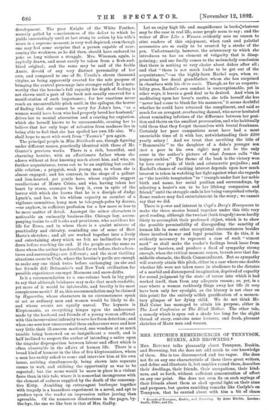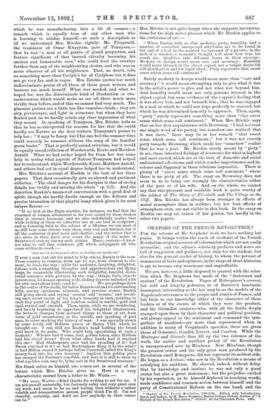MRS. RITCHIE'S REMINISCENCES OF TENNYSON, RUSKIN, AND BROWNING.* MRS. RITCHIE
talks pleasantly about Tennyson, Ruskin, and Browning, but she does not add much to our knowledge of them. She is too disconnected and too vague. She doe& not fix on any one characteristic of these three great writers, and define and illustrate it, but rambles round them, describes. theirdwellings, their friends, their occupations, their kind- ness, and so forth, without sufficient concentration of effort on any one point. She does not even fix on such sayings of their friends about them as shed special light on their alma and purposes, but quotes rambling remarks like Carlyle's on Tennyson, that he carried about with him a bit of chaos
* Records of Tennyson, Ruskin, and Browning. By Anne Ritchie. Leaden: Smith, Elder, and Co.
which he was manufacturing into a bit of cosmos,—a remark which is equally true of any other man who is learning to subdue himself, —or such a description as
(if we understand Mrs. Ritchie rightly) Mr. Fitzgerald, the translator of Omar Khayyam, gave of Tennyson,—
that he was "a man at all points of grand proportion, and feature significant of that inward chivalry becoming his ancient and honourable race," who could hurl the crowbar further than any of the neighbouring clowns, and who was an acute observer of all his neighbours. That, no doubt, tells us something more than Carlyle's bit of Carlylese, but it does not go very far, and is vague. Mrs. Ritchie quotes too much indiscriminate praise of all three of these great writers, and bestows too much herself. What was needed, and what we hoped for, was the discriminate kind of illustration or cha- racterisation which would make us see all three much more -vividly than before, and of this we cannot find very much. The pleasant praises are a little too like cumulus clouds ; they are airy, picturesque, and light in structure, but when they have floated past us we hardly retain any clear impression of what they meant. In speaking of Tennyson, Mrs. Ritchie tells us that he has so interpreted the seasons for her that she could hardly see Nature as she does without Tennyson's poems to help her ; "it may be fancy, but I for one feel the summer time could scarcely be summer without the song of the familiar green books." That is perfectly sound criticism, but it would be equally sound criticism of Wordsworth, Keats, and Matthew Arnold. What we had rather hoped for from her was some help in seeing what aspects of Nature Tennyson had helped her to understand, which Wordsworth, Keats, Matthew Arnold, and others had not in equal degree helped her to understand. Mrs. Ritchie's account of Ruskin is the best of her three papers. That does occasionally give us shrewd and pertinent criticism. "The chief danger for his disciples is that of seeing details too vividly and missing the whole" (p. 122). And she describes Ruskin's manner of conversation with a good deal of spirit, though she hardly dwells enough on the delicate and precise intonation of that playful irony which gives it its most unique flavour :—
"If we look at the Elgin marbles, for instance, we feel that the standard of human attainment is for ever raised by those broken lines ill eternal harmony, and we also indefinitely realise that while looking at them we ourselves are at our best in sculpture ; and so listening back to the echoes of a lifetime we can most of us still hear some strains very clear, very real and distinct, out of all the confusion of past noise and chatter ; and the writer (nor is she alone in this) must ever count the magic of the music of Brantwood oratory among such strains. Music, oratory—I know not what to call that wondrous gift which subjugates all who come within its reach :- 'God uses us to he'p each other so, lending our minds out.'
If ever a man lent out his mind to help others, Ruskin is the man. From country to country, from age to age, from element to ele- ment, he leads the way ; while his audience, laughing, delighted, follows with scrambling thoughts and apprehensions and flying leaps, he meanwhile illustrating each delightful, fanciful, dicta- torial sentence with pictures by the way—things, facts, objects interwoven, bookcases opening wide, sliding drawers unlocked with his own marvellous keys—and lo We are perhaps down in the centre of the earth, far below Brantwood and its surrounding hills, among specimens, minerals, and precious stones, Ruskin still going ahead, and crying ' sesame ' and sesame,' and reveal- ing each secret recess of his king's treasury in turn, pointing to each tiny point of light and rainbow veiled in marble, gold and opal, crystal and emerald. Then, again, while we are wondering, and barely beginning to apprehend his delightful illustrations, the lecturer changes from natural things to those of art, from veins of gold meandering in the marble, and speaking of past ages, to coins marking the history of man. I was specially struck by some lovely old Holbein pieces of Henry VIII. which he brought out. I can still see Ruskin's hand holding the broad gold mark in its palm. Who could help speculating at such a moment ? Whence had it come, that golden token, since Holbein laid his chisel down? From what other bands had it reached this one ? Had Shakespeare once had the spending of it ? had Bacon clutched at it ? or had Buckingham flung it to the wind ? or had Milton owned it perhaps before Cromwell called the King's money back into his own treasury ? Anyhow this golden piece has escaped the Puritan's crucibles, and here it is still to show us what &gulden coin may be, lying safe in the Brantwood treasury."
His frank satire on himself, too, comes out in several of the letters which Mrs. Ritchie gives us. Here is a very characteristic morsel from a letter to Mr. Watts :—
" My DEAR WATTS.—Kind thanks for writing to ask for me. I am not unwell materially, but furiously sulky and very quiet over my work, and mean to be so, and having been hitherto a rather voluble and demonstrative person. people think I'm ill. I'm not cheerful, certainly, and don't see how anybody in their senses can be."
Mrs. Ritchie is not quite happy when she suggests interpreta- tions for the high moral phrases which Mr. Ruskin applies to the criticisms of art :—
"When Ruskin tells us that modesty, piety, humility, and a number of somewhat unexpected attributes are to be found in the curl of a leaf, in the painted background of a picture, in the arch of a window, a moment's thought will show how true his words are. Qualities take different forms in their exercise : Modesty in design would mean care and accuracy ; Humility would mean interest in the object copied, not a vulgar desire for self-glorificatim and for rapid effect; Piety represents that sweet sense which some call sentiment."
Surely modesty in design would mean more than "care and accuracy," it would mean attempting only to give what it was in the artist's power to give, and not what was beyond him.
And humility would mean not only genuine interest in the object copied, but some evidence of the copyist's feeling that it was above him, and not beneath him ; that he was engaged in a task in which he could not hope perfectly to succeed, but which be was determined honestly to approach. Then, again, " piety " surely represents something more than "that sweet sense which some call sentiment." When Mrs. Ritchie says that on her first acquaintance with Browning," I had not read one single word of his poetry, but somehow one realised that it was there," there may be in her remark "that sweet sense which some call sentiment ;" but it was not exactly piety towards Browning which made her " somehow " realise that he was a poet. Mr. Ruskin surely meant by " piety " in art, those inherited feelings of reverence for what is highest and most sacred, which are at the root of domestic and social and national affections, and which render impertinence and in- solence and flippancy in these relations impossible. There is plenty of "sweet sense which some call sentiment" where there is no piety at all. The essay on Browning does not seem to us to bring out strongly the characteristics either of the poet or of his wife. And on the whole, we cannot say that this pleasant and readable book is quite worthy of the author of The Story of Elizabeth and The Village on the Cliff. Mrs. Ritchie has always been stronger in effects of moral atmosphere than in outline ; but her best effects of atmosphere even, are not visible in this book. In the essay on Ruskin one may see traces of her genius, but hardly in the other two papers.







































 Previous page
Previous page